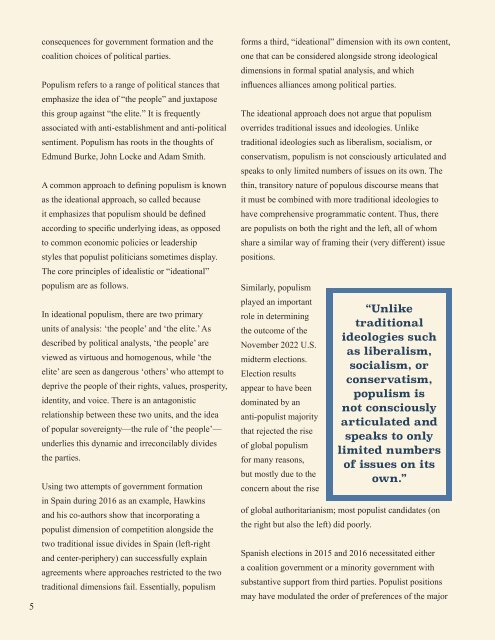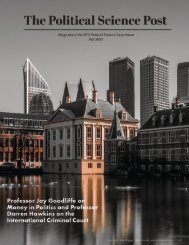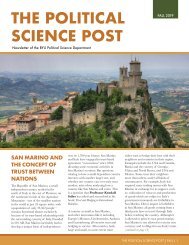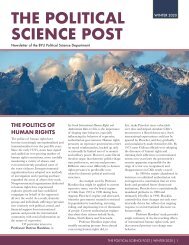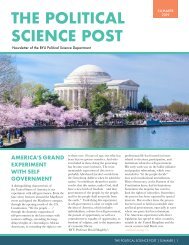You also want an ePaper? Increase the reach of your titles
YUMPU automatically turns print PDFs into web optimized ePapers that Google loves.
5<br />
consequences for government formation and the<br />
coalition choices of political parties.<br />
Populism refers to a range of political stances that<br />
emphasize the idea of “the people” and juxtapose<br />
this group against “the elite.” It is frequently<br />
associated with anti-establishment and anti-political<br />
sentiment. Populism has roots in the thoughts of<br />
Edmund Burke, John Locke and Adam Smith.<br />
A common approach to defining populism is known<br />
as the ideational approach, so called because<br />
it emphasizes that populism should be defined<br />
according to specific underlying ideas, as opposed<br />
to common economic policies or leadership<br />
styles that populist politicians sometimes display.<br />
The core principles of idealistic or “ideational”<br />
populism are as follows.<br />
In ideational populism, there are two primary<br />
units of analysis: ‘the people’ and ‘the elite.’ As<br />
described by political analysts, ‘the people’ are<br />
viewed as virtuous and homogenous, while ‘the<br />
elite’ are seen as dangerous ‘others’ who attempt to<br />
deprive the people of their rights, values, prosperity,<br />
identity, and voice. There is an antagonistic<br />
relationship between these two units, and the idea<br />
of popular sovereignty—the rule of ‘the people’—<br />
underlies this dynamic and irreconcilably divides<br />
the parties.<br />
Using two attempts of government formation<br />
in Spain during 2016 as an example, Hawkins<br />
and his co-authors show that incorporating a<br />
populist dimension of competition alongside the<br />
two traditional issue divides in Spain (left-right<br />
and center-periphery) can successfully explain<br />
agreements where approaches restricted to the two<br />
traditional dimensions fail. Essentially, populism<br />
forms a third, “ideational” dimension with its own content,<br />
one that can be considered alongside strong ideological<br />
dimensions in formal spatial analysis, and which<br />
influences alliances among political parties.<br />
The ideational approach does not argue that populism<br />
overrides traditional issues and ideologies. Unlike<br />
traditional ideologies such as liberalism, socialism, or<br />
conservatism, populism is not consciously articulated and<br />
speaks to only limited numbers of issues on its own. The<br />
thin, transitory nature of populous discourse means that<br />
it must be combined with more traditional ideologies to<br />
have comprehensive programmatic content. Thus, there<br />
are populists on both the right and the left, all of whom<br />
share a similar way of framing their (very different) issue<br />
positions.<br />
Similarly, populism<br />
played an important<br />
role in determining<br />
the outcome of the<br />
November 2022 U.S.<br />
midterm elections.<br />
Election results<br />
appear to have been<br />
dominated by an<br />
anti-populist majority<br />
that rejected the rise<br />
of global populism<br />
for many reasons,<br />
but mostly due to the<br />
concern about the rise<br />
of global authoritarianism; most populist candidates (on<br />
the right but also the left) did poorly.<br />
“Unlike<br />
traditional<br />
ideologies such<br />
as liberalism,<br />
socialism, or<br />
conservatism,<br />
populism is<br />
not consciously<br />
articulated and<br />
speaks to only<br />
limited numbers<br />
of issues on its<br />
own.”<br />
Spanish elections in 2015 and 2016 necessitated either<br />
a coalition government or a minority government with<br />
substantive support from third parties. Populist positions<br />
may have modulated the order of preferences of the major


